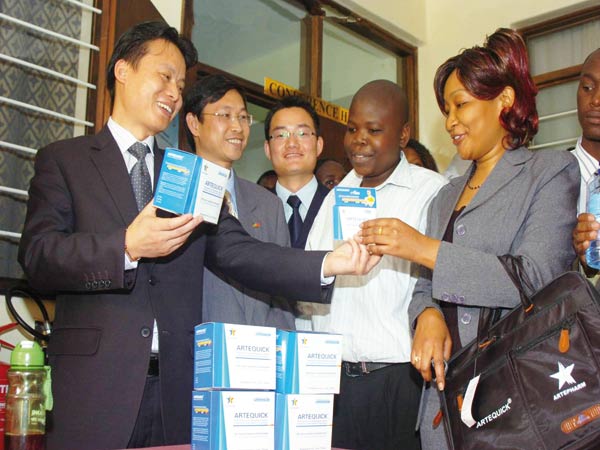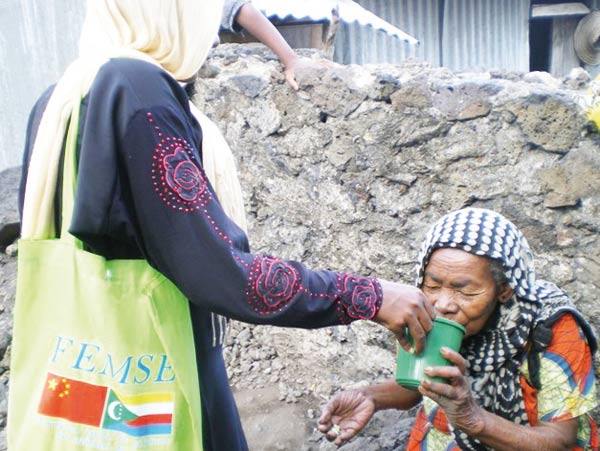
News & Events
Partner News
-
Guangdong New South Group Spearheads Efforts to Help Prevent and Eradicate Killer Disease
Fighting Africa's Biggest Epidemic -
02/12/2013
-
Chinese medicines could well prove to be the panacea for African nations in tackling malaria, a disease that accounts for the greatest number of deaths on the continent.
While big donors such as the US-based Gates Foundation and British drugmaker GlaxoSmithKline are spearheading the fight by spending huge amounts on long-term solutions such as preventive vaccines, valuable support is also being provided by Chinese drug firms with medicines that seek to stop the disease at the carrier stage.
Leading Chinese efforts is Guangdong New South Artepharm Co. which has taken a twin-pronged approach to fighting malaria in Africa. The company, a unit of the Guangzhou-based diversified business enterprise Guangdong New South Group Co. Ltd., plans to tackle the disease with its artemisinin-based anti-malarial medicines and also increase awareness about the disease on the ground with its spirited public campaigns.
"We have been stepping up our overseas marketing efforts, actively participating in trade shows and establishing offices in the malaria-endemic areas of Africa, Southeast Asia and South America," says Chen Yuejin, vice-president of Guangdong New South Group.
Founded in 1994, the privately held company is engaged in manufacturing traditional Chinese medicine, property development, hotel services, energy development and financial services.
Its business extends across more than 20 cities in the Chinese mainland along with overseas locations such as Singapore, Australia, Kenya and Nigeria. According to Chen, the company has offices in 16 African countries, with the largest presence being in Nigeria, with representative offices in Abuja, Lagos and Kano.
Chen says the company has also embarked on a brand-building initiative through public campaigns and advertisements in buses and on the radio. The real efforts will also focus on getting the company co-opted as an anti-malarial bulk drug supplier for international organizations, governments and charitable groups, which account for 70 to 80 percent of the global anti-malarial medicine market.
Malaria is Africa's deadliest disease, killing more than 600,000 people every year, mostly children. Billions of dollars are spent every year to find new ways to check the spread of the disease in Africa. The Chinese efforts will no doubt prove valuable, experts say.
Guangdong New South made its foray into anti-malarial medicine in 2006 by teaming up with the Guangzhou University of Chinese Medicine. The company decided to market Artemisinin, an anti-malarial drug extracted from artemisia annua, or sweet wormwood plants that are native to China.
According to company officials, Guangdong New South has extensive sweet wormwood plantations in Fengshun county, Meizhou, Guangdong province, along with extraction units. The company has already applied for patent protection in 57 countries for its anti-malarial medicines and is a registered supplier in 14 African countries, Cambodia and Myanmar.
Chen says that after extensive clinical trials in the African island nation of Comoros, the company perfected what is now called the "Fast Elimination of Malaria through Source Eradication".
"We achieved remarkable results," Chen says, adding that the trials took place on the island of Moheli in Comoros, where 23 percent of the 36,000 residents were carriers of plasmodium, the parasite responsible for human malaria.
All residents on Moheli took the malaria medicine twice daily, and in four months the percentage dropped to 0.33 percent, he says. "Three years after the trials, the plasmodium carriage rate fell to just 1 to 2 percent."
"We repeated the trials in Anjouan, another island with a population of 310,000, last year and succeeded in bringing the plasmodium carriage rate down from 19 percent to 0.5 percent," Chen says, adding that the process would be extended to other parts of Comoros soon.
Guangdong New South delivered 24 million yuan ($3.94 million) of anti-malarial medicine in June to the Ministry of Health to support China's global efforts in tackling malaria.
"Ninety percent of the 660,000 malaria deaths reported worldwide last year occurred in Africa. The disease still kills one African child every minute," says Luis Sambo, the regional director for the World Health Organization in Africa.
Chen from Guangdong New South says that apart from marketing efforts, the company is also investing in free trade zones to attract more Chinese investors to Africa.
Guangdong New South has through its fully owned unit in Lagos acquired a 51 percent stake in China-Africa Investment Co from State-owned Guangdong Xinguang International Group. China-Africa Investment operates the Nigeria Ogun Guangdong Free Trade Zone in Ogun, Nigeria. The zone covers an area of 100 square kilometers and houses more than 30 enterprises.
"The zone will be attractive for Chinese companies that are planning expansion in Africa," says Chen.


Li Wenfang in Guangzhou
China Daily 2013-12-02
http://www.chinadaily.com.cn/business/2013-12/02/content_17143646.htm
Launch of the Fight Against Malaria
Defeating malaria is a victory for the economy
The fight against malaria through Mass Drug Administration in Ngazidja was launched in the afternoon of Thursday, October 10 in Mkazi Ya Bambao. The event has been a big ceremony attended by the President of the Union and its government, the governor of Ngazidja, commissioners, prefects and mayors, villages’ chiefs and the diplomatic corps.
Migration flows
The ceremony, which has been massively attended by the population, provided an opportunity for the Chinese Ambassador to officially give the drugs to the vice president in charge of Health. Several speeches were made for the occasion. Youssouf Mohamed Boina expressed his joy, and reaffirmed the confidence that the entire city of Mkazi has in President Ikililou Dhoinine. "We are ready to accompany you wherever you want to drive us, even in the depths of the horizon," said the dignitary. Ali Abdullah, who spoke on behalf of the dignitaries of Ngazidja, thanked all the initiators of this project, especially the People's Republic of China that was acclaimed with a rain of applause. He also called on health authorities to take a look at the other diseases such as diabetes and hypertension. Chinese Ambassador, whose country is the initiator of the malaria fast elimination project in the Comoros, through Artequick, announced that this project will be funded with Comorian Francs 1.2 billion. "We applaud the efforts of the two governments to quickly eliminate this scourge," he said. Wang Leyou did not fail to mention the success that this operation had in Mwali and Ndzuwani. However, the diplomat said that this campaign in Ngazidja will face a problem of migration flows. Governor Mouigni Baraka spoke of statistics showing that about 40,251 cases registered in the Comoros, 40,141 are registered in Ngazidja". The Chief Executive of the island stated that "the fight against malaria is a victory for the economy of our country."
Support
For the Head of State, the fight began when he was vice president in charge of Health and has talked about the difficulties and pressures he had when he approved this project. "But with all the success it has had, everybody is approving it now," said President Ikililou Dhoinine.
Therefore, he noted that the Clinton Foundation, which had not accepted this project, is now satisfied with the "quick and convincing results." The president made an impassioned appeal to domestic and international partners to support the project, which is, according to him, “a real measure to reduce expenses for Comorians” who had to pay around Comorian Francs 40,000 for treatment. “Imagine a family of six, how will they afford that? He asked before thanking the audience for coming out to show their support for the malaria fast elimination project in the Comoros.
By Nassila Ben Ali. Oct. 24, 2013
http://www.artepharm.com/NewsShow/en/518.html
Copyright © 4L Health Co., Ltd. & Foryou Medical Electronics Co., Ltd. All Rights Reserved.

